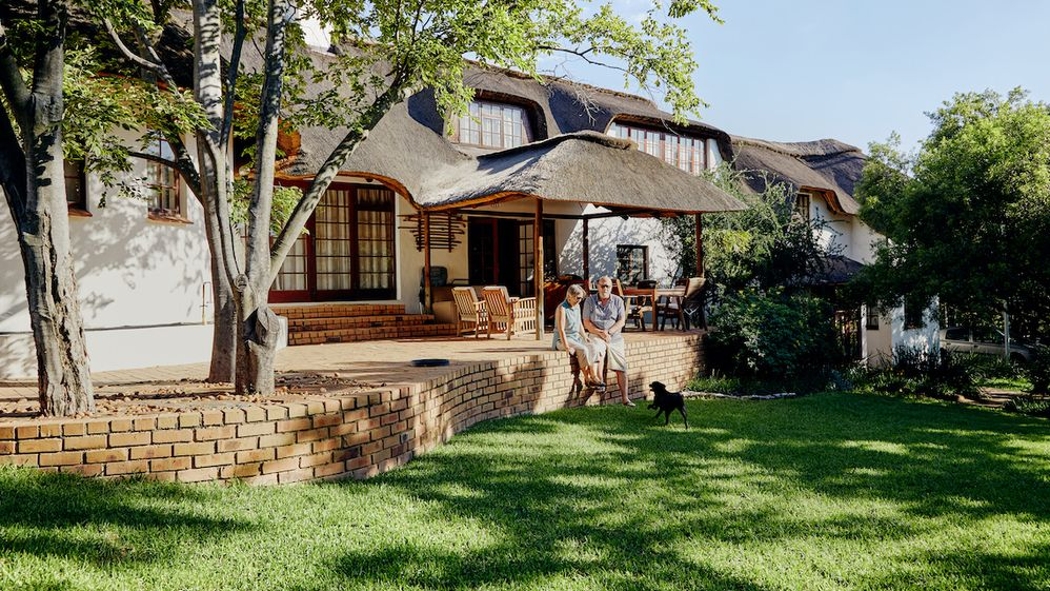Як збудоване власноруч помешкання допомогло двом супергосподарям частково піти на пенсію
For Superhosts Mary and Buster Reynolds, hospitality and home building have been a part of their lives for 40 years. “It’s a way of life,” Buster said. He and his wife Mary have been building their home by hand since 1980, and sharing it with guests. “With all these new people coming in, you get to look at your home again with fresh eyes. We are really proud of what’s happened.” The property—located in a former bird sanctuary, a 30-minute bus ride from Johannesburg, South Africa—has a main house with three guest rooms, as well as two guest cottages. And the couple finally completed it “last night!” Mary laughed, “I literally just finished tiling the new bathroom.”
Mary and Buster took some time away from tiling to tell us how they started hosting, how it’s helped support them through retirement, and why there may be another house just like theirs 3,000 miles away in Nigeria.
Hand building a home seems like a massive undertaking. Did you both work in construction before?
Mary: “Actually, no. Buster is a retired cinematographer, and I worked most of my life in education. We used to have a landlord who built cottages, and they were built so poorly that we thought, if he could do it ... we could do it better. So Buster did a bricklaying course, and I bought a plumbing book.”
That’s your training?
Buster: (laughs) “We didn’t have the money to buy a home back then. It was the only way we could get the house we wanted on the piece of land we wanted. So we started with 3,000 rand ($218 USD) and went from there. It was every weekend, every spare minute, every spare cent that went into the home.”
Mary: “Buster did the structure, and I worked on the inside. The beams are made from local gumtrees, and a lot of the other wood came from the Crown Mines scrapyard, one of the first gold mines in Johannesburg. The only thing we contracted out was the electricity and the thatched roof because it’s very specialized. Thatching is a traditional craft, so we hired local experts to thatch the roof with grass hand-cut by their wives. It’s like Michelangelo and the Sistine Chapel, spending almost a lifetime up and down ladders. It’s like living in a work of art.”
Has chatting about the house become a good way to connect with guests?
Buster: “Yes, definitely. The house is open-plan, which in 1980 wasn’t even in the dictionary. Now times have finally caught up with us! Guests come in through the kitchen door and immediately connect with [the home and] what we’re serving them for breakfast: homegrown and homemade jams, pickles, and chutney as well as home-baked granola and muffins. There’s always a variety of breads, plenty of coffee and Rooibos tea, which is a South African thing. We spend at least an hour at the breakfast table talking.”
Mary: “We had a group from Nigeria who had anticipated a 5-star hotel. When they walked in their faces dropped, but it wasn’t long before they mellowed into the experience. By the time they left, one asked for a copy of our house plans because he wanted to build a house like ours. So somewhere in Nigeria there may be a clone of our house.”
That sounds like the highest compliment! How did you get started hosting?
Mary: “Through the AFS—American Field Service, an international exchange program. In 1984, we did an amazing trip to America and upon our return, AFS was looking for host families. Since then, we’ve hosted seven students, each for a year and from all over the world. Hosting became a way of life for us. We also added two cottages, originally for our parents, and then as rentals. In 2017, our daughter Katy encouraged us to join Airbnb, and we started getting bookings almost immediately.”
What do you enjoy most about hosting?
Mary: “It’s the people. We’ve always enjoyed having people here, learning about different cultures, and learning about why people come to South Africa. We had an amazing group of African Americans from Chicago who wanted to discover their roots. We directed them to places where we thought they’d enjoy authentic African experiences. And they were completely bowled over and felt a great affinity with the culture.”
Buster: “There was also this Argentinian man who was so fascinated by our composting system that he wanted to go back and start a compost business. It’s stories like that that keep us going.”
Mary: “Plus, Buster had to take early retirement and as I am semi-retired, this supplemental income has made a huge difference. It’s allowed us to continue to live in our home. We also employ two domestic workers and a gardener. If we didn’t have the Airbnb income, they would also lose their jobs. Our intention is not to make a profit or a killing—absolutely not—but just to retain our home and keep Nelly, Elizabeth, and Mishek employed.”
Do you have any advice for hosts?
Mary: “You’ve got to enjoy what you’re doing–otherwise it’s not worthwhile. We do enjoy it. And when people appreciate things, you know you’re doing it right.”
Information contained in this article may have changed since publication.
